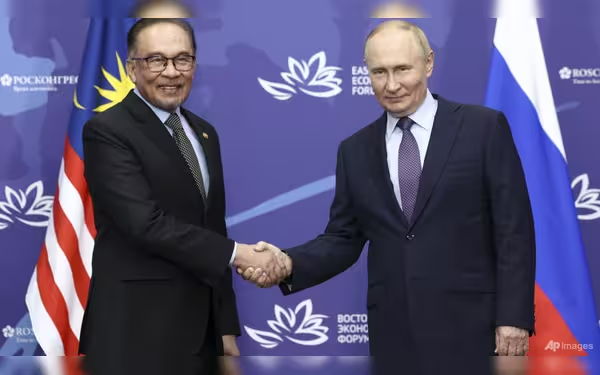Saturday, November 16, 2024 07:43 PM
Anwar Ibrahim's Controversial Visit to Russia Amid Ukraine Conflict
- Anwar praises Putin, seeks closer ties with Russia.
- Critics accuse Anwar of ignoring Ukraine war.
- Malaysia's foreign policy faces ethical scrutiny.
 Image Credits: channelnewsasia
Image Credits: channelnewsasiaAnwar Ibrahim's visit to Russia raises ethical questions amid Ukraine conflict, sparking debate on Malaysia's foreign policy.
Malaysian Prime Minister Anwar Ibrahim recently made headlines with his first-ever visit to Russia, a move that has sparked considerable debate and criticism. This visit comes at a time when Russia is embroiled in a conflict with Ukraine, which began with Russia's illegal invasion in 2022. Anwar's attendance at the Eastern Economic Forum (EEF) in Vladivostok, at the invitation of Russian President Vladimir Putin, raises questions about Malaysia's stance on international conflicts and its diplomatic relationships.
During his two-day visit, Anwar met with Putin and delivered a speech at the EEF, where he praised the Russian leader for his "vision and leadership". He referred to Russia as a "key partner" and expressed a desire to establish a "special relationship" between the two nations. This is significant, as Anwar became the sixth Southeast Asian leader to meet with Putin since the onset of the Ukraine conflict, joining leaders from Indonesia, Myanmar, Thailand, Laos, and Vietnam.
In his discussions, Anwar emphasized the importance of collaboration in various sectors, including Islamic banking, agriculture, energy transition, and science and technology. He encouraged Russian companies to invest in Malaysia and welcomed the idea of direct air links between the two countries. As the chair of the Association of Southeast Asian Nations (ASEAN) in 2025, he also committed to strengthening the organization’s Dialogue Partnership with Russia, indicating that Malaysia is keen on maintaining a positive relationship.
However, Anwar's visit has not been without controversy. Critics argue that by engaging with Russia, he is turning a blind eye to the ongoing war in Ukraine. Throughout his visit, Anwar was careful not to address the sensitive topic of the conflict directly, which some see as an attempt to avoid embarrassing his host. His only comment on the situation was a tweet expressing hope for a "constructive path towards a peaceful and sustainable resolution to the conflict in Ukraine". This cautious approach has led to accusations of double standards, especially as Malaysia navigates its foreign policy in a complex global landscape.
Anwar Ibrahim's visit to Russia highlights the delicate balance that Malaysia must maintain in its international relations. While fostering economic ties with Russia may benefit Malaysia, it also raises ethical questions about the country's stance on global conflicts. As Malaysia prepares to take on a leadership role in ASEAN, it will be crucial for Anwar to navigate these waters carefully, ensuring that the nation's interests are aligned with its values. The world is watching, and how Malaysia responds to these challenges will shape its diplomatic future.













